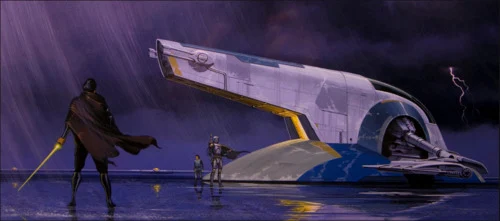While the film has been subject to a range of critiques, from its dialogue to its pacing, what is often overlooked is its thematic richness. "Attack of the Clones" is not merely a space opera filled with dazzling special effects and epic battles; it is a complex narrative that delves into a multitude of themes that are profoundly relevant to both the fictional galaxy it portrays and our own world. These themes include the erosion of democratic values in the face of rising authoritarianism, the ethical quandaries surrounding love and emotional attachment, the moral complexities of war and peace, and the intricate dynamics of identity and self-discovery.
George Lucas employs a variety of storytelling elements to explore these themes, from the political machinations in the Galactic Senate to the personal struggles of characters like Anakin Skywalker and Padmé Amidala. The film also utilizes its rich lore, including the Jedi Code and the Sith philosophy, to provide a nuanced lens through which these themes can be examined.
Political Intrigue and the Decay of Democracy
In a galaxy far, far away, the very institutions designed to uphold justice and democracy are crumbling from within, a theme that resonates eerily with our own world's challenges. "Attack of the Clones" offers a compelling look at the decay of democracy through the lens of the Galactic Senate and the Jedi Council, institutions that are ostensibly pillars of justice and governance but are shown to be deeply flawed.The Galactic Senate and Its Inefficacy
The Galactic Senate, once a beacon of democratic ideals, is portrayed as a bureaucratic quagmire, paralyzed by its own complexity and the competing interests of its members. Senators engage in endless debates, but their words rarely translate into action. This inefficacy is not merely a backdrop; it's a critical plot point that enables the rise of authoritarian figures like Chancellor Palpatine. He masterfully exploits the Senate's weaknesses, positioning himself as the solution to the very problems he exacerbates.
Palpatine's Manipulation and the Erosion of Democratic Institutions
Emperor Palpatine, still operating under the guise of a benevolent leader, is the puppet master pulling the strings of the decaying democratic system. His Machiavellian tactics are not just about personal power; they reflect a broader theme of how easily democracy can be subverted from within. Palpatine's orchestration of the Separatist movement and the subsequent push for the Military Creation Act are calculated moves to centralize power. The Senate, in its desperation for stability, grants him emergency powers, unwittingly setting the stage for its own demise.
The Role of the Jedi Council in Politics
The Jedi Council, traditionally separate from political machinations, finds itself entangled in the web of Galactic politics. Their role as peacekeepers becomes increasingly murky as they are drawn into the conflict. Characters like Mace Windu and Yoda grapple with the ethical implications of their new roles, embodying the theme of how even the most virtuous can be compromised in a decaying system.
 |
| Hey Padme....do you like sand? |
Love and Attachment
"Attack of the Clones" is not just a tale of political intrigue and galactic warfare; at its heart, it is also a love story that explores the complexities of emotional attachment and its ethical implications. This theme is most vividly embodied in the relationship between Anakin Skywalker and Padmé Amidala, but it also reverberates through the Jedi Code and its teachings.Anakin Skywalker and Padmé Amidala's Relationship
The love story between Anakin and Padmé is not just a subplot; it's a thematic cornerstone that illuminates the tension between personal desire and societal duty. Anakin, trained as a Jedi who must avoid attachments, finds himself irresistibly drawn to Padmé.
Their love is not just a romantic entanglement; it serves as a crucible for Anakin's internal struggles. His love for Padmé becomes a gateway to his darker emotions—jealousy, possessiveness, and ultimately, fear of loss. These emotions are the antithesis of Jedi teachings, making their relationship a thematic fulcrum that tilts Anakin closer to his tragic destiny.
The Tension Between Duty and Personal Desire
Padmé Amidala, a dedicated public servant, also experiences the tension between love and duty. Her role as a Senator demands that she prioritize the needs of her constituents and the galaxy at large, yet her love for Anakin pulls her in a different direction. This tension is not merely emotional but ethical, raising questions about the sacrifices required by leadership and the ethical dilemmas inherent in personal attachments.
The Jedi Code's Stance on Emotional Attachment
The Jedi Code, with its emphasis on emotional detachment, serves as a thematic counterpoint to Anakin and Padmé's relationship. The Code is not just a set of rules but a worldview that shapes the Jedi's interactions with the galaxy. Characters like Obi-Wan Kenobi embody the Code's ideals, yet even he struggles with the emotional complexities of mentorship and friendship.
The Code's stance on attachment is revealed to be both a strength and a weakness, providing emotional clarity but also limiting the Jedi's ability to fully understand the complexities of love and attachment.

War is not just a backdrop for action sequences in "Attack of the Clones"; it is a thematic landscape rife with ethical dilemmas and moral complexities. The film raises critical questions about the nature of conflict, the ethics of creating life for warfare, and the role of the Jedi as both peacekeepers and warriors.

The Ethics of War
War is not just a backdrop for action sequences in "Attack of the Clones"; it is a thematic landscape rife with ethical dilemmas and moral complexities. The film raises critical questions about the nature of conflict, the ethics of creating life for warfare, and the role of the Jedi as both peacekeepers and warriors.
The Creation of the Clone Army
The discovery of the Clone Army on Kamino is a pivotal moment that introduces a host of ethical considerations. These clones, created solely to serve as soldiers, raise questions about the morality of creating life for the purpose of war. They are not just troops; they are living beings, and their existence challenges the ethical boundaries of science and warfare.
The film subtly asks: What does it mean to create disposal life only to send it into battle?
Ethical Considerations of Cloning for Warfare
The clones are not merely foot soldiers; they are a manifestation of the ethical gray areas that war often creates. They are genetically engineered to be obedient, effectively stripping them of free will. This dehumanization is a thematic echo of real-world ethical debates about the use of technology in warfare, such as drone strikes and automated weapons systems.
The clones serve as a cautionary tale about the potential loss of humanity in the machinery of war.
The Jedi's Role as Peacekeepers vs. Warriors
The Jedi, traditionally peacekeepers, find themselves in a new and uncomfortable role as generals in the Clone Wars. This shift is not just a change in title but a thematic exploration of the moral ambiguity inherent in war. Characters like Yoda and Mace Windu must reconcile their roles as peacekeepers with the violent realities of war, highlighting the ethical tightrope that the Jedi must walk.
Their involvement in the war also serves to further blur the lines between the 'good' and the 'bad,' complicating the simplistic morality often associated with conflict.
Identity and Self-Discovery theme of Attack of the Clones
"Attack of the Clones" is a journey into the psyche of its characters, exploring their internal struggles with identity in a galaxy fraught with external challenges. This theme is most evident in Anakin Skywalker's transformation but also manifests in other characters like Obi-Wan Kenobi and even the clones themselves.Anakin's Journey from Padawan to a Conflicted Jedi
Anakin Skywalker is at a crossroads, caught between his Jedi training and the emotional turmoil that threatens to consume him. His identity crisis reaches a boiling point when he slaughters the Sand People who kidnapped his mother. This act is not just a moment of personal failure; it's a thematic milestone that marks a significant departure from his Jedi teachings. The massacre reveals the darker aspects of his identity, fueled by anger and a desire for vengeance. It serves as a grim foreshadowing of the path that lies ahead, highlighting the theme of how one's choices can shape, or distort, one's identity.
The Prophecy and the Burden of Expectations
Anakin's struggle with identity is further complicated by the prophecy that he is the "Chosen One" meant to bring balance to the Force. This prophecy places an enormous burden on him, shaping how others perceive him and how he perceives himself. It adds an additional layer to his identity crisis, forcing him to reconcile his own desires and flaws with the larger-than-life expectations placed upon him.
Obi-Wan Kenobi's Role as a Mentor and His Own Journey
Obi-Wan Kenobi, Anakin's mentor, also undergoes a journey of self-discovery. His identity as a Jedi Master is tested as he grapples with the challenges of mentorship and the unfolding political chaos. Obi-Wan's investigation into the assassination attempts on Padmé and the discovery of the Clone Army serve as parallel thematic elements that explore his own growth and limitations as both a Jedi and an individual.
Jango Fett and Boba Fett: A Look into Legacy and Identity Through Cloning
The theme of identity is not limited to the Jedi; it also extends to characters like Jango Fett and his clone/son, Boba. Their relationship serves as a thematic mirror to the clones, raising questions about legacy and individuality. Jango's decision to create Boba as an unaltered clone adds a poignant layer to the theme of identity, questioning whether our sense of self is shaped by our genes, our upbringing, or our own choices.

Technology and Its Implications
In "Attack of the Clones," technology is not merely a tool; it's a thematic element that raises questions about ethics, humanity, and the potential dangers of scientific advancement. From the droids that populate the galaxy to the cloning facilities on Kamino, technology serves as both a marvel and a menace.The Advancements in Droid Technology
The film showcases the evolution of droid technology, most notably through the battle droids employed by the Separatists. These droids are not just foot soldiers; they represent the ethical quandaries of using automated beings in warfare. Their lack of sentience allows for mass production and deployment, but it also raises questions about the ethics of creating life-like entities solely for the purpose of destruction.
Ethical Considerations of Using Technology in Warfare
The use of technology in warfare is a recurring theme, exemplified by the creation of the Clone Army and the deployment of battle droids. These technological advancements bring efficiency and scale to the conflict but at the cost of ethical integrity. The film subtly questions whether the benefits of technological advancement in warfare outweigh the moral and ethical costs, such as the dehumanization of combat and the potential for misuse.
The Role of Technology in Surveillance
The theme of technology extends to the realm of surveillance and information gathering, as seen in Obi-Wan's investigation into the assassination attempts on Padmé. His use of tracking devices and holographic communication reflects the galaxy's advanced state of technology but also hints at the potential dangers of surveillance culture. The ease with which information can be accessed and monitored raises questions about privacy and the ethical use of technology in a society.
The Nature of Good and Evil
"Attack of the Clones" challenges conventional notions of good and evil, presenting a more nuanced view that reflects the complexities of morality. The film explores this theme through its portrayal of the Jedi and the Sith, as well as characters who operate in the moral gray areas, like Count Dooku.The Dualities Represented by the Sith and the Jedi
The Jedi and the Sith serve as the primary embodiments of good and evil in the Star Wars universe, but "Attack of the Clones" complicates this binary. The Jedi, while striving for peace and justice, are shown to be flawed, entangled in political machinations and ethical dilemmas.The Sith, though driven by darker motives, are not merely caricatures of evil; they are products of the same system that produced the Jedi, highlighting the thin line that separates the two.
The Moral Complexities of Characters Like Count Dooku
Count Dooku, a former Jedi turned Sith Lord, serves as a fascinating study in moral complexity. He is not just an antagonist but a character who embodies the theme of how good intentions can lead to dark outcomes. Dooku's disillusionment with the Jedi Order and the Galactic Senate leads him down a darker path, yet his critiques of these institutions are not entirely unfounded.
His character serves as a reminder that the journey from good to evil is often a series of small steps, each justified by a larger cause.
The Thin Line Between Good Intentions and the Path to the Dark Side
The film explores the theme that the road to hell is often paved with good intentions. Characters like Anakin and Dooku start with noble goals—love, justice, peace—but their methods lead them toward darker ends. This theme is encapsulated in Anakin's slaughter of the Sand People, an act driven by love and grief but resulting in a horrifying massacre. It serves as a cautionary tale about the potential for good intentions to become corrupted, leading even heroes down a darker path.
Conclusion on the themes of Attack of the Clones
"Attack of the Clones," the second installment in George Lucas's Star Wars prequel trilogy, is a film of remarkable thematic depth and complexity. Far from being a mere space opera, it serves as a rich tapestry that weaves together a multitude of themes—political decay, love and attachment, the ethics of war, identity and self-discovery, technological implications, and the nuanced nature of good and evil. Each of these themes is not just a subplot but a critical lens through which the film examines the human condition and societal issues.
The film's thematic richness is amplified by its characters, from Anakin Skywalker's tragic journey to Padmé Amidala's ethical dilemmas, from the moral complexities of Count Dooku to the ethical quandaries faced by the Jedi Council. These characters serve as conduits for the film's themes, embodying the ethical and emotional struggles that make "Attack of the Clones" a compelling narrative.
The film's thematic richness is amplified by its characters, from Anakin Skywalker's tragic journey to Padmé Amidala's ethical dilemmas, from the moral complexities of Count Dooku to the ethical quandaries faced by the Jedi Council. These characters serve as conduits for the film's themes, embodying the ethical and emotional struggles that make "Attack of the Clones" a compelling narrative.
















